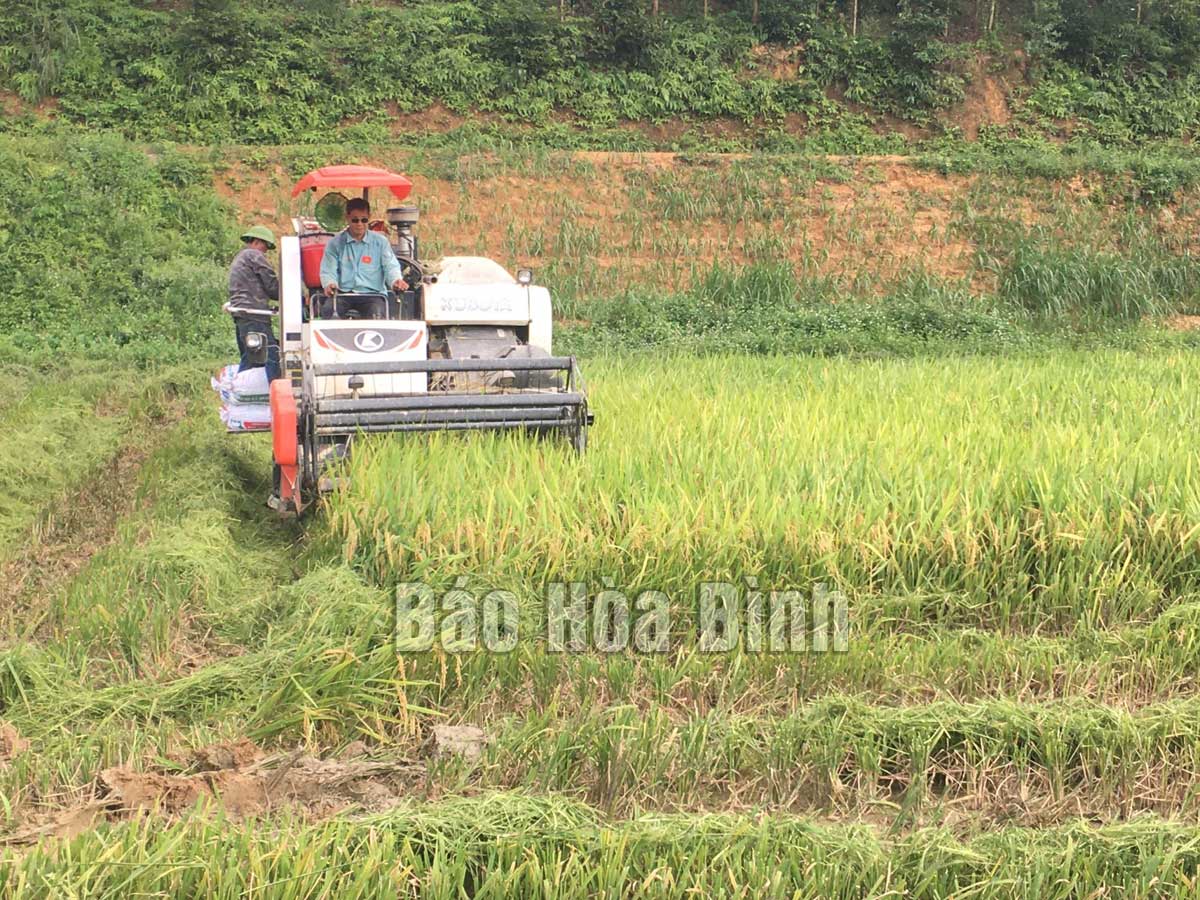
(HBO) – Facing the small farmland area and land fragmentation, Lac Thuy district has promoted land consolidation to form concentrated and large-scaled production zones so as to facilitate production connectivity, science - technology application, mechanisation, and reorganisation of agricultural production.
After land consolidation, An Binh commune of Lac Thuy
district has been moving to mechanise agriculture.
Though An Binh is a remote commune of Lac Thuy
district, it has taken the lead in land consolidation and obtained initial
outcomes. In 2018, it piloted the work in five hamlets, namely Dong Bau, Dong
Rat, Tien Lu, Phu Tuong, and Roc In. The consolidation was expanded to Dong
Bong and Ninh Noi hamlets in 2019, raising the consolidated area to more than
179ha in seven hamlets. It was carried out successfully in Ninh Ngoai and Dai
Dong hamlets last year and continued on 100.5ha in the five remainders in 2021.
So far, all the hamlets across An Binh have conducted land consolidation
successfully.
Chairman of the communal People’s Committee
Quach Cong Muoi said to secure success in land consolidation, An Binh chose the
fields with many advantages and persuade locals there to carry out first in
order to encourage residents in other hamlets to support the policy.
He noted that the successful land consolidation
has addressed land fragmentation and abandonment while facilitating the
mechanisation of agriculture. In particular, it has created a basis for forming
concentrated production zones and applying scientific and technical advances.
The successful consolidation to improve people’s income and living conditions
is the best demonstration of the entire political system’s engagement in mass
mobilisation.
Localities used to encounter a number of
difficulties in land consolidation while some people didn’t support the policy.
However, thanks to local authorities’ strong efforts, patience to persuade
local residents, and implementation of uniform, flexible, and reality-matching
solutions, people have supported and taken part in the work.
Ngo Dinh Tam, head of the division for
agriculture and rural development of Lac Thuy district, said given the
practical benefits from land consolidation, in the time ahead, the district
will order localities to push ahead with the work to gain better effectiveness,
thereby creating an important basis for boosting production connectivity, farm
produce sales, agricultural development, people’s income, as well as the
new-style rural area building.
Lac Thuy is striving to consolidate over 735ha
of farmland in all the 10 communal-level localities in the 2021 - 2025 period,
he added./.
Hoa Binh province is undergoing a dynamic transformation amid Vietnam’s national digital transition. Building on Poliburo’s Resolution No. 57-NQ/TW on breakthroughs in science, technology, innovation, and national digital transformation, the province has rolled out a wide range of practical action plans. A standout initiative is the "Digital Literacy for All” movement, an effort to ensure that no one is left behind in the digital era.
Hoa Binh province is undergoing a dynamic transformation in the wake of the national digital transformation movement. Building on Resolution No. 57-NQ/TW of the Politburo on breakthroughs in science, technology, innovation, and national digital transformation, the province has implemented a wide range of practical action plans. A standout initiative is the "Digital Literacy for All” movement ambitious effort to ensure that no one is left behind in the digital age.
With a spirit of unity and proactive problem-solving, the Party Committee, the government and the people of Dong Lai Commune (Tan Lac District) have made great strides in implementing the resolutions of the 24th Party Congress of the commune for the 2020 - 2025 term. Focusing on leadership and practical actions, the commune has brought the Party’s resolutions into daily life, creating strong impacts and pushing the local development forward.
Amid the nationwide push for digital transformation, young people in Hoa Binh Province are stepping up as dynamic pioneers, applying technology to enhance Youth Union operations and expand the reach of youth-led initiatives. Through creativity and adaptability, Youth Union organizations at all levels have introduced a series of practical solutions, contributing to modern governance and community development.
In recent years, An Nghia commune, located in Lac Son district, has stepped up administrative reform, focusing on improving the quality and efficiency of its single-window service unit for receiving and processing administrative procedures. These improvements have helped create favourable conditions for local residents and organisations to handle administrative procedures, contributing to the commune’s broader socio-economic development.
The Prime Minister-approved master plan to develop the multi-use value of forests ecosystems through 2030, with a vision to 2050, aims to improve the management and sustainable use of forest resources, create jobs, increase incomes, and improve the living standards of ethnic minorities, people in mountainous and remote areas, forest workers and those living near forests.



